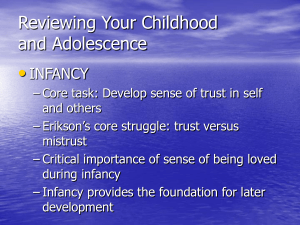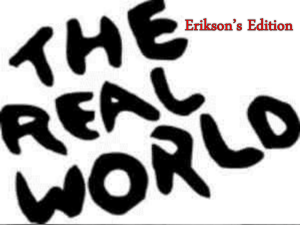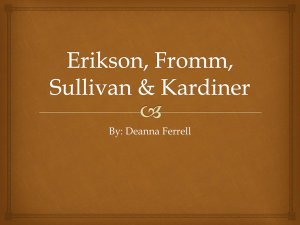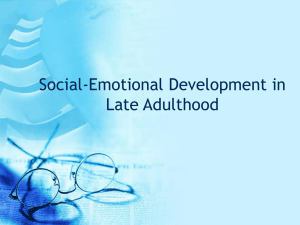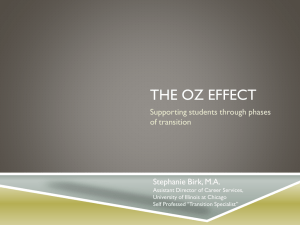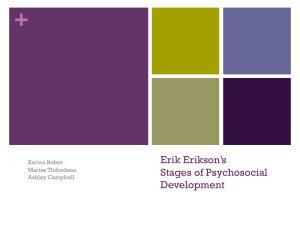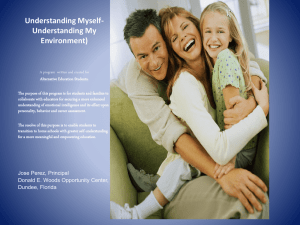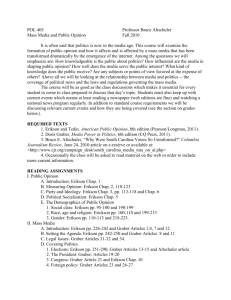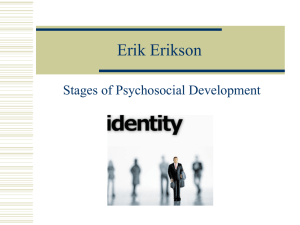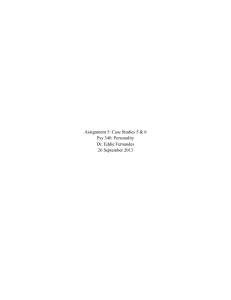Erikson`s Theory
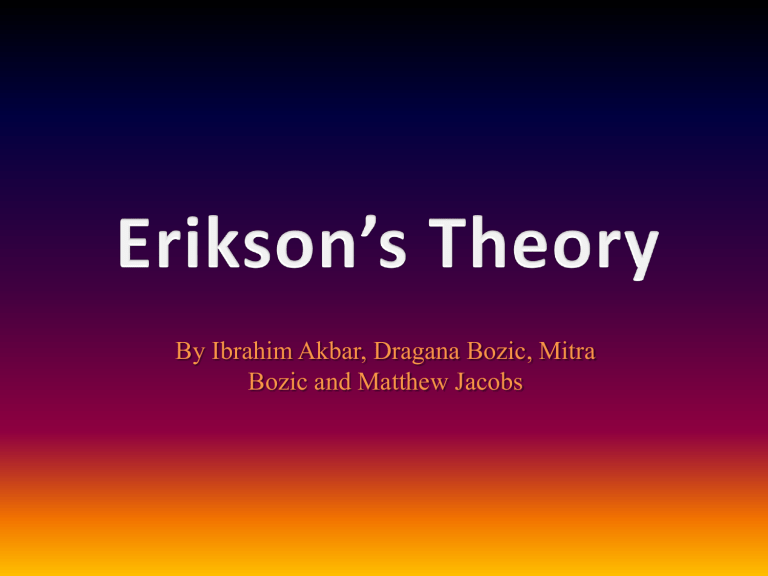
By Ibrahim Akbar, Dragana Bozic, Mitra
Bozic and Matthew Jacobs
Erik Erikson was the man who did a great deal to explore the concept of how we view ourselves based on inborn traits or other characteristics. With the influence of Freud, he believed that the ego exists from birth and that behaviour is not totally defensive. He felt the course of development is determined by the interaction of the body, mind and cultural influences. He was able to do this because of his strong interest and compassion for people, especially young people, and also because his research was carried out among human societies and not just the more inward-looking world of a psychoanalyst's couch.
The first stage of Erik Erikson's theory is Infancy, which started from birth and ranged all the way up to 18 months. This was named the Hope and Drive stage.
Erikson believed that during these years of a child's life, major emphasis was on the nurturing ability of the mother and father and that the basic conflict is trust between the child and its parents. Erikson believed that this stage was very important for the trustworthy relationship to establish amongst the toddler and the parents because if the child was able to go through this stage successfully then he or she would be able to go through life with the basic confidence that is needed to be successful.
If they do not experience trust he or she may develop insecurity, worthlessness and mistrust for the world. Many studies of suicides and suicide attempts point to the importance of the early years in developing the basic belief that the world is trustworthy and that every individual has a right to be here.
The second stage of Erikson’s theory was early childhood which ranged between 18 months to the age of 3. It is known as the
Willpower and Self-Control stage. The theory behind this part of the child’s life was that the toddler is able to be more independent which contributed to their sense of autonomy meaning to do things independently so if the child is to be supported and encouraged in their increased independence they become more confident and more secure in their ability to survive. It is also a very vulnerable stage of the child's life so if he or she is criticized or shamed in the process of learning important skills they may feel great self-doubt and feel inadequate in their ability to survive which would ultimately result in low self-esteem and they would become to dependent on others.
Erikson wanted to show that this part of the child's life is very important for them to feel a realisation of being independent.
Erikson’s third stage development theory is preschool, which is aged from 3-5 years old. The life stage virtue is Purpose and Direction with the basic conflict between child and parents.
During this period we experience the want to copy the adults around us and take initiative in creating ‘play’ situations. We make up stories with
Barbie's and Ken's, toy phones and miniature cars’, playing out roles in a trial universe and experimenting with what we think it means to be an adult or grown up. If we're frustrated over natural desires and goals, we may easily experience guilt.
Erikson’s fourth stage development theory is School age, where the age range is from 6-12 years old. The basic conflict is making the transition from everything depending on our parents to things depending also with school and the neighbourhood. The life style virtue is Method and Competence.
During this stage, often called the Latency, we are capable of learning, creating and accomplishing numerous new skills and knowledge, thus developing a sense of industry. This is also a very social stage of development and if we experience unresolved feelings of inadequacy and inferiority among our peers, we can have serious problems in terms of competence and self-esteem. As the world expands a bit, our most significant relationship is with the school and neighbourhood.
Parents are no longer the complete authorities they once were, although they are still important.
Erikson's fifth stage of development is Adolescence, which ranges from 12-18 years. The life stage virtue is Devotion and Fidelity and the basic conflict is having to figure out who we are, in society as well as for yourself.
Up to this stage, according to Erikson, development mostly depends upon what is done to us. From here on out, development depends primarily upon what we do. And while adolescence is a stage at which we are neither a child nor an adult, life is definitely getting harder as we attempt to find our own identity, struggle with social interactions, and come to grips with moral issues. Our task is to find out who we are as individuals separate from our family and as members of a wider society. Unfortunately for those around us, in this process many of us go into a period of withdrawing from responsibilities, which Erikson called a "moratorium." And if we are unsuccessful in accomplishing this stage, we will experience role confusion.
Erikson’s sixth stage of development is young adulthood.
The life stage virtue of this is Affiliation and Love and the basic conflict is isolation. People search for a love partner, sometimes failing and sometimes accomplishing a successful relationship. People try to find relationships that satisfy their needs and help start a family to carry on the next generation. People who lack intimacy can become isolated and without satisfaction, resulting them to possibly becoming elitists and feel superior to society. Significant relationships are those with friends and spouses.
Erikson’s seventh stage of development is middle adulthood and the age range for this is usually 35-
55/65. The life style virtue is Production and Care, with the basic conflict of self-absorption/stagnation.
Most people focus on work, they have responsibilities and need to take charge. Their children eventually grow up and leave home and most circumstances change. The “mid-life crisis” may possibly occur and if people do not cope with it, they become self-absorbed and stagnate. Significant relationships are those with family and friends/coworkers.
Erikson’s last stage is maturity/late adulthood, with the age range from 55/65 - death. The life virtue of this is wisdom with the basic conflict as despair. People will retire and reflect back on their entire lives. Some feel they’ve contributed to society and are happy with what they made of their life. They embrace the inevitable death as life’s completion. Others feel they’ve done no good and wonder if it was worth it and if they could have done something different. Others still, feel that only they have done good and show more elitists’ traits. Significant relationships are with everyone.
Erik Erikson’s theory, unlike many other theories of development, describes changes which take place across the entire lifespan from birth to older age. Erikson showed how each stage of development could have a positive and negative outcome. This made his theory more appealing to clinical psychologists and psychiatrists. However Erikson's theory was different in the aspect that he emphasises on the role of the individual in their own psychological development. One criticism on Erikson’s theory is that it lacks experimental evidence to support it. Another criticism is that it did not consider the way in which socio-cultural influences have different effects on males and females, criticism was also made about more specific aspects of the theory such as the fact that identity is found when you are in your adolescence stage. Although people tried to find errors of Erikson’s theory they could not go past the fact that he had one of the best theories in the psychological development of the human being.
